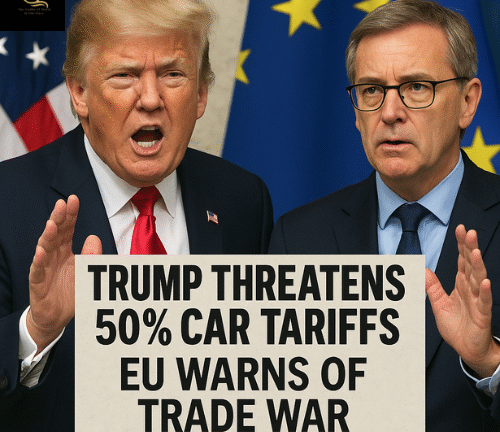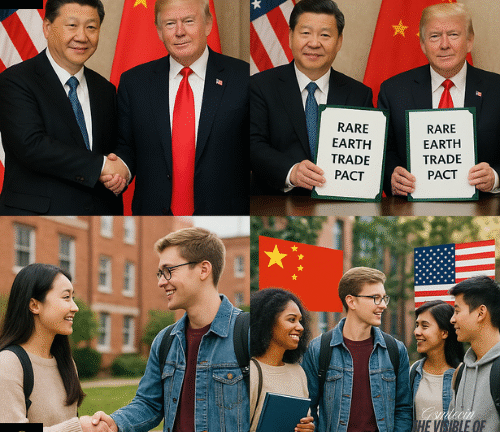In a sharp escalation of transatlantic tensions, the European Union has responded forcefully to former U.S. President Donald Trump’s recent threat to impose 50% tariffs on European car imports should he win reelection in November 2024. Trump’s remarks, delivered during a campaign rally in Michigan earlier this month, have triggered alarm across European capitals and reignited concerns about the future of U.S.-EU trade relations under a second Trump administration.
Trump’s Tariff Threats Return
Donald Trump has continually blamed the EU for getting an unfair ride through trade deals with America. His 2017-2021 administration was defined by a fierce, protectionist trade agenda that ranged from imposing tariffs on EU steel and aluminum imports on national security pretext—to widespread retaliation from Brussels and a sharp decline in economic diplomacy.
At the heart of Trump’s latest threat is the long-standing dispute over the automotive sector. “If the European Union doesn’t play fair, we’re going to hit them with a 50% tariff on their cars,” Trump said, asserting that the U.S. auto industry has been undermined by cheaper European imports, particularly from Germany. The announcement was greeted with loud applause from his base but with concern by economic analysts and trade officials.
EU’s Stinging Retort: “We Demand Respect”
It didn’t take long for European leaders and trade officials to react. European Commission President Ursula von der Leyen denounced the language as “dangerous and counterproductive,” repeating the value of respect in transatlantic relations. “We are allies, not enemies,” she stated. “Threats like these erode decades of cooperation and mutual gain.”
European Council President Charles Michel seconded those words when he said, “The European Union does not react to intimidation. We expect respect, and we will protect the interests of our member states with all means at our disposal.
The EU has even started working on contingency plans in the event that Trump’s planned tariffs materialize. Brussels is weighing a series of retaliatory tariffs on US exports, such as farm products, manufacturing goods, and technology inputs, according to officials in the Commission. The EU is also seeking legal recourse under the platform of the World Trade Organization (WTO), which monitors international trade and settles disputes among members.
Economic Stakes Are High

The automotive sector is among the biggest and most integrated transatlantic trade industries. German automobile manufacturers like Volkswagen, BMW, and Mercedes-Benz have invested billions into manufacturing and distribution networks in the United States. Similarly, American firms like Ford and Tesla are present in European markets. In 2023, almost 1.1 million vehicles were exported from the EU to the United States, according to the European Automobile Manufacturers Association (ACEA), with a total value of over €50 billion.
A 50% tariff would drastically increase the price of EU-produced cars in the US market, possibly cutting European automakers’ competitiveness and affecting employment on both sides of the Atlantic. Economists warn that this could trigger retaliatory tariffs, disturbing international supply chains and further putting pressure on an already weak global economic recovery.
“A tit-for-tat tariff war between the two biggest economic blocs would be disastrous,” said Carla Santos, a trade economist at the London School of Economics. “It could inflate prices for consumers, lower business investment, and undermine the trust that’s needed for stable international relations.”
Transatlantic Relations at a Crossroads by Christopher Lockwood
The EU’s reaction to Trump’s rhetoric represents a wider realignment of its relationship with the United States. Though President Joe Biden has sought to revive diplomatic relations with Europe and has avoided weaponizing tariffs, European leaders are still cautious about the U.S.’s long-term commitment to multilateralism.
Trump’s threat is a wake-up call that Europe must become more strategically independent,” EU High Representative for Foreign Affairs Josep Borrell said. “We cannot be dependent on one political term in Washington.
European policymakers are mounting a growing call for more investment in home industries, stronger trade partnerships with Asia and Latin America, and a stronger role for the euro in international financial markets to cut dollar dependence.
U.S. Business Community Voices Concern
The American business community has also responded with unease to Trump’s threats. The U.S. Chamber of Commerce made a statement saying that rising tensions in trade with Europe would “undermine American exports and harm key industries.” Auto manufacturers specifically, many of whom use parts and supply chains that traverse the Atlantic, worry that increased tariffs could derail operations.
“Trade wars aren’t good for anybody,” said General Motors CEO Mary Barra. “What we want is predictability, open markets, and fair rules—not punitive actions that upend the very system we all rely upon.”
Possible Outcomes and Next Steps
If Trump does win the Republican nomination and then the presidency in 2024, his envisioned trade policies can become a defining element of his administration’s agenda. In the meantime, the EU is taking steps to prepare for all possibilities, including diplomatic efforts with Republican and Democratic Party leaders in the U.S. to maintain support for multilateral trade.
Trade specialists argue much will rely on whether or not European leaders are able to present a collective response, as internal conflicts among EU members have previously undermined the union’s negotiation stance in previous negotiations. The most from being lost is by Germany, with its dominant automobile industry, which will likely advocate for a moderate but resolute stance.
In the short term, though, dialogue and deterrence will still be at the center. “We hope that reason prevails,” EU Trade Commissioner Valdis Dombrovskis stated. “But if pushed, the European Union will not hesitate to act to defend its economic interests.”
Conclusion
Trump’s fresh threat to put 50% tariffs on European automobiles is more than just a campaign slogan—it’s a sobering reminder of the precarious nature of worldwide trade relations in an increasingly changing geopolitics. As the EU calls for respect and prepares for possible economic showdown, the road forward will put to test the robustness of the transatlantic relationship and the durability of global trade mechanisms. Whether that leads to cooperation or conflict will depend not only on electoral results, but on whether both sides are willing to put the common good ahead of political gamesmanship.




